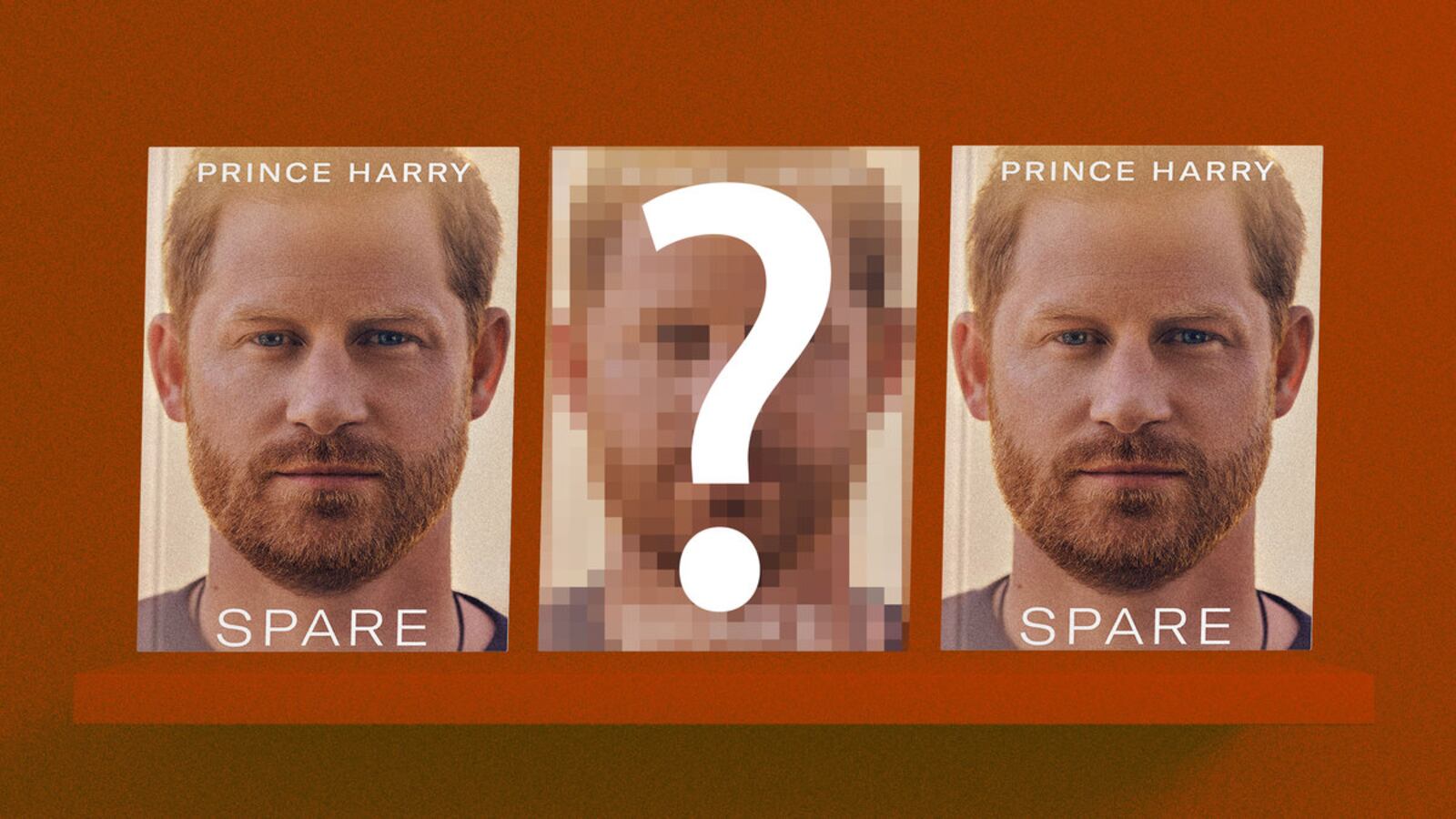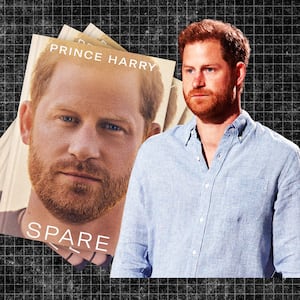Extraordinary new polls show that Prince Harry and Meghan Markle’s popularity has plummeted in America as well as the U.K. since the prince published Spare–and yet his book continues to break sales records, has fired up his base online, and garnered plenty of flat-out rave reviews (most recently earning praise from The Daily Beast’s founding editor and the royal éminence grise, Tina Brown).
The counterintuitive state of affairs—that an increasingly unpopular person could write what is turning out to be the world’s most popular book right now—has left many scratching their heads as they try to make sense of the newest data out of America—a poll of 2,000 American voters conducted for Newsweek six days after the book’s publication.
In the space of a month, the poll, carried out by Redfield and Wilton, shows Prince Harry has dropped a staggering 45 points in United States public opinion while Meghan has dropped 36. They are even losing support among the young, who have been their most reliably faithful constituency, the full data shows, with 31 percent of 18-24s viewing Harry positively and 38 percent viewing him negatively.
Incredibly, Meghan is now less popular than Camilla in America.
Asked how their opinion of Harry and Meghan had changed since the book and his Netflix documentary, 16 percent said they had a more positive view but 24 percent had a more negative view. Ouch!
Complicating the narrative, however, is an Ipsos MORI poll for the Telegraph which found that post-publication, Prince William and Kate Middleton’s ratings have also plunged 8 and 7 percentage points in the U.K., while Harry’s and Meghan’s have dipped 7 and 5 points respectively. However, it’s not quite a case of “a curse on both your houses” as William, coming off a major post-royal funeral high, still has an enviable 61 percent approval rating (compared to Harry’s dismal 23 percent), with 70 percent thinking he will be a good king.
The findings from the U.S. suggest that the couple are following the same trajectory stateside as in the U.K., where a YouGov poll published last week found the prince’s net favorability rating is now at an all-time low of -44 (down from -38 just a week ago, pre-book release), making him even more unpopular than Meghan, on a lowly -42.
A separate Ipsos MORI poll of American voters also quoted by the Telegraph found, less dramatically than Newsweek, that Harry was down 11 points in the U.S. after the book’s publication—with the added comfort that William was down 13. However, this poll was taken on Jan. 11, so it does not rule out the fact that Harry’s support could indeed have tumbled by Jan. 16 to the levels recorded by Newsweek, especially given the ubiquity of his media appearances between Jan. 11 and Jan. 16.
Jack Royston, Newsweek’s royal correspondent, who commissioned the polling, said he suspected that the difference between the Jan. 11 polling and the Jan. 16 data was down, absurdly, to the discussion of Harry’s penis.
“January 11 was only the day after the book came out, and it took a little while for the clip about him putting Elizabeth Arden on his frostbitten penis while thinking of his mother to circulate. I think that clip is a significant component part of this, as it turned him into a figure of ridicule. Harry and Meghan put a great deal of work into curating an Obama-style higher-ground brand through Archewell being the home of compassion. But the predominant discussion online became about Harry’s crown jewels, and he ended up being mocked by Jimmy Kimmel and Jimmy Fallon on network TV. That is, basically, a PR disaster.”
Many would disagree with that. The discussion of the penis was definitely fervent—but it hardly would make Harry unpopular!
The sales figures for Harry’s book are truly extraordinary. It has broken multiple records but one stands out above all—it is the fastest-selling non-fiction book in history, according to the Guinness Book of Records, “shifting 1.43 million copies during its first day on sale in the UK, US, and Canada.” It has easily knocked down the previous record, Barack Obama’s fourth book, A Promised Land (2020), which sold 887,000 copies on its release day.
And on social media, while there are plenty of haters to be sure, there also seems to be renewed support for the couple, with the memoir and interviews arguably firing up their voluble fan base.
What’s going on? Why the disconnect? And how should we understand how the book has ultimately affected Harry and Meghan’s image?
Eric Schiffer, chairman of Reputation Management Consultants, says there is no doubt the appetite for his book has been voracious.
Schiffer told The Daily Beast: “Royal war sells. Royal fans and those mystified by the elegance and glamor of the monarchy are fascinated even more by fresh, intimate, royal family venom. Spare is clickbait on crack.”
But, he says, that doesn’t automatically translate into popularity for Harry. “He is losing independents. There is significant sentiment fatigue; his orchestrated bombshells have appeared circus-like,” he says.
Schiffer added that Harry has muddied the positive associations of his own brand by attacking his family: “His verbal ass-kicking of members of the royal family clashes with the carefully buffed, richly positive image he was previously associated with. When a celebrity brand known for positive sentiment starts making negative attacks, the schism can result in a loss of trust, emotional connection, and value misalignment in the minds and hearts of followers.
“The U.S. had viewed Harry positively partly because he stayed above the fray and focused on social causes, bringing a spotlight on mental health and equality for example. But his spite over slights and his all-but-machine-gunning of the royal family has made it easy to regard him as another whining, reality TV character.”
The other question is: Are the dipping popularity numbers across the royal board temporary, and likely to bounce back—or will the damage done to the royal family by the revelations in Spare be more long-lasting, as my colleague Clive Irving eloquently argued in a recent essay.
Norah Lawlor, president and founder of New York-based Lawlor Media Group, which runs crisis and reputation management communications strategy, told The Daily Beast that raking over the past rather than selling a bright future is also a factor.
“What is interesting from a strategy point of view is we now all know the ins and outs of his quarrel with his family and the media and all the details of Meghan’s wedding bridesmaid’s dresses and his frost-nipped private parts—but there has been absolutely no substantive indication of what his future plans are,” Lawlor said. “This book has done nothing to draw media interest or attention regarding a new platform to champion whatever causes they believe in pursuing.
“Spare draws a line under the past from his personal perspective but does not open the door to the next chapter in his life for the reader.”
Yes, but can the author of the world’s hottest book really be experiencing plummeting poll numbers?
Lawlor argues the book itself is destroying the platform on which Harry stands: “The correlation between interest in the Harry tell-all and declining poll numbers is clear; the book is actually chipping away at Harry’s relationship with the royal family—the thing Americans are fascinated by and the British revere.”
Lawlor’s conclusion: “Rubbishing your No. 1 calling card is a risky strategy.”







